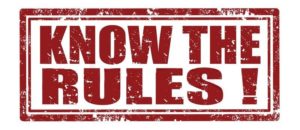Prohibited Transactions in a Checkbook IRA
The IRS prohibits certain types of investments and transactions when using a tax-deferred plan. The guidelines for prohibited transactions are outlined in Internal Revenue Code Section 4975. The Checkbook IRA must be used within these guidelines in order to retain its tax-deferred status.
In general, a prohibited transaction is the improper use of the IRA account by you, a beneficiary, or a disqualified person. A disqualified person includes the account owner’s fiduciary and members of the account owner’s family.

Disqualified Persons:
- You, the owner of the plan
- A member of your family
- The custodian or administrator of the plan
- Any person who provides a service to the plan
- Any corporation, partnership, trust, or estate in which you directly or indirectly own 50% or more
- An officer, director, highly compensated employee, or shareholder of 10% or more of the entity described above
Prohibited Transactions: Self-Dealing
A self-dealing transaction is any transaction that is made in the interest of or for the benefit of you, a beneficiary, or a disqualified person. Using the account to benefit yourself or a disqualified person is considered self-dealing and is prohibited.
Real Estate
Property cannot be purchased by the IRA account with the intent to live in or use it in any way by you or a disqualified person. Doing so would be considered self-dealing. Real estate that is held within an IRA must be for investment purposes only.
Private Placements
The IRA cannot hold private equity shares in your or a disqualified person’s business. This would be using the retirement account to benefit your or a disqualified person’s business.
Promissory Notes
The IRA cannot be used to lean money to yourself or to any other disqualified person.
Stepped Transactions
A stepped transaction is a transaction that is one or more steps toward making a prohibited transaction. This may be on purpose in order to circumvent tax laws, or it may be by accident. The IRS considers this self-dealing and thus a prohibited transaction.
Understanding Stepped Transactions
An example of a stepped transaction would be using the IRA account to loan money to a nondisqualified person who will then loan the money to another person who will then loan the money to you.
Prohibited Asset Types
The IRA is also prohibited from investing in the following three asset types:
- Life insurance
- Stock of a sub-chapter S corporation
- Collectibles – items that the U.S. Treasury deems as collectibles including art, antiques, and stamps.
These three prohibited asset types serve as categories that may include other items as well. Check with the IRS or a qualified tax professional before investing in an item that may fall within a prohibited asset type.
Penalties
Using the IRA to invest in prohibited assets or transactions may result in the plan losing its tax-deferred status and being subject to various taxes and penalties. Determining what is and is not a prohibited transaction or asset can vary in complexity depending on how the investment is structured.
It is important to proceed with caution and consult with a qualified tax professional before making an investment decision with a Checkbook IRA account.
IRS Resources
- IRS Publication 590
- IRS Bulletin Section 4975
- https://www.irs.gov/retirement-plans/plan-participant-employee/retirement-topics-prohibited-transactions
Because there are many choices and scenarios when investing in alternative assets, it’s important that you understand your unique situation and how the tax laws and codes might impact you.
What our Clients are Saying:
Alternate investment options with your self-directed account:
Investments That Make Sense!
It’s Your Money. It’s Your Future. Invest Your Way.
Our expert team is always ready to answer you! Give us a call at (949) 228-9394. You can email us at contact@sensefinancial.com


